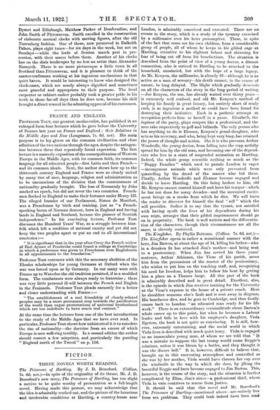The Kingfisher. By Phyllis Bottome. (Collins. 7s. 6d. net.)— The
Kincfisher opens in rather a sensational manner with the hero, Jim Barton, at about the age of 14, killing his father—who in a drunken fit has attacked Jim's mother—and being sent to a penitentiary. When Jim has served his three years' sentence, Arthur Atkinson, the Vicar of his parish, saves him from the persuasions of the master of the penitentiary, who wishes to put him on the teaching staff, and, recognizing his need for freedom, helps him to follow his bent by getting him a place on a Thames barge. All this part of the book is admirably described and in great detail. Excellent, also, is the episode in which Jim receives training for the University at the Vicar's expense in the house of a private coach. Here he shoulders someone else's fault and is sent away in disgrace. His benefactor dies, and he goes to Cambridge, and then finally comes back to London "an educated man ready for his life work." There is an extraordinary verisimilitude about Barton's whole career up to this point, but when he becomes a Labour' leader and falls in love with his employer's daughter, Viola Egerton, the book is not quite so convincing. It is still, how- ever, extremely entertaining, and the social world in which Viola lives is described with much quiet irony. Viola is engaged to an immaculate young man, of whom we are told that "It was a mistake to suppose the last tramp would rouse Reggie's relations, unless it was blown by a butler, and they thought it was the dinner bell." It is, however, difficult to believe that, brought up in this enervating atmosphere and controlled as she was by her mother, Viola would have thrown her cap over the windmills in the way in which she does, by jilting the beautiful Reggie and have become engaged to Jim Barton. This, however, is the course of the story, and the situation is further complicated by Eliza, Jim's sister—a professional thief, whom Viola in vain contrives to rescue from justice.


































 Previous page
Previous page